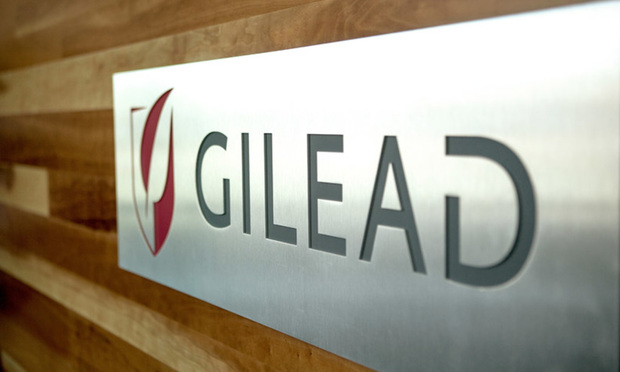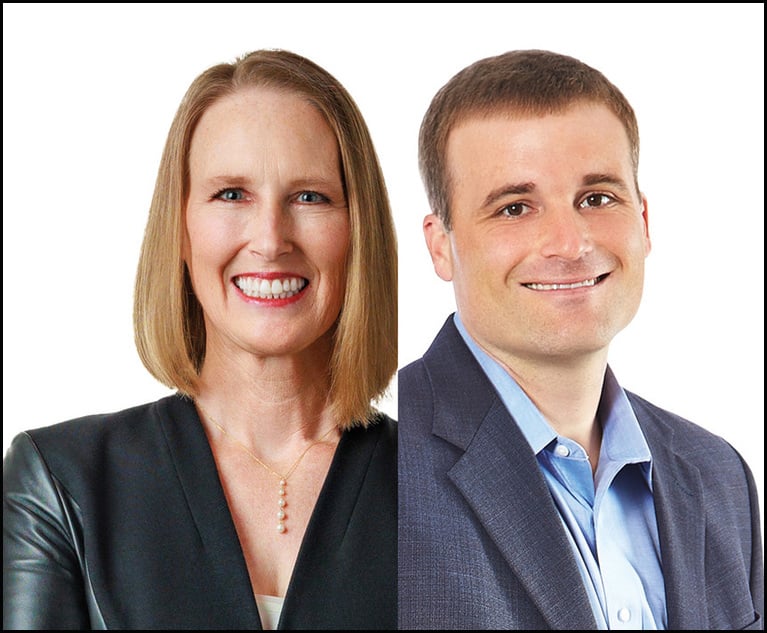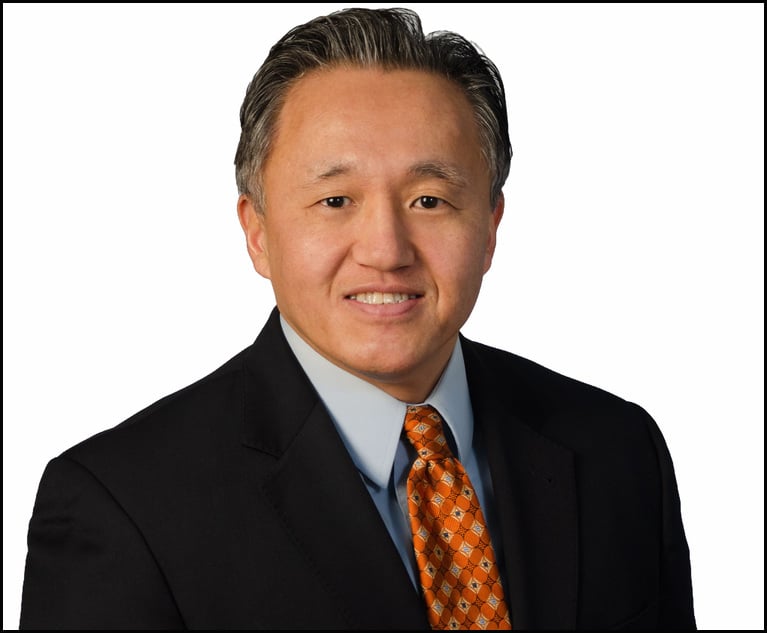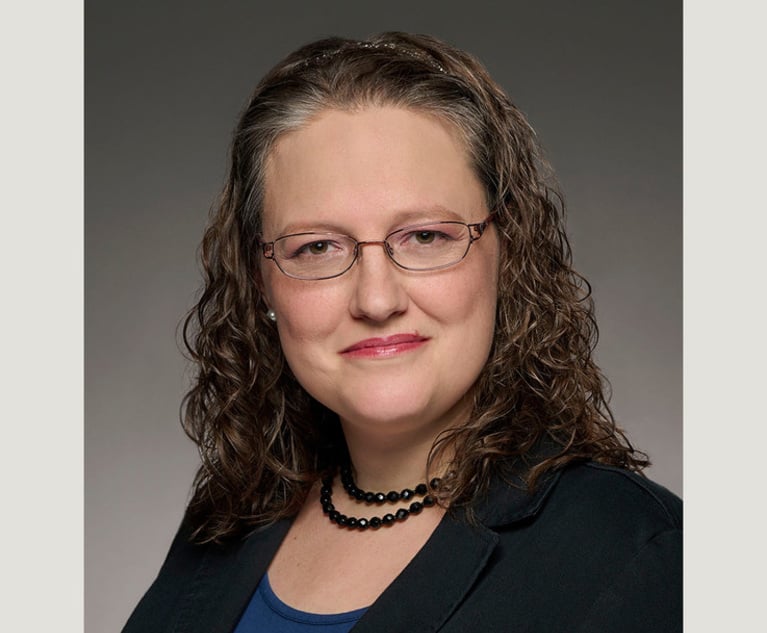Gilead Accuses Teva of Infringing Hep C Drug as Sales Decline
Gilead Sciences Inc. on Tuesday sued to stop a rival drugmaker from bringing a generic version of Sovaldi to market, as the company continues its campaign to protect the hepatitis C treatment amid rapidly declining sales.
March 28, 2018 at 06:17 PM
3 minute read

Gilead Sciences Inc. on Tuesday sued to stop a rival drugmaker from bringing a generic version of Sovaldi to market, as the company continues its campaign to protect the hepatitis C treatment amid rapidly declining sales.
The 26-count complaint, filed in the U.S. District Court for the District of Delaware, accused Israeli-based Teva Pharmaceutical Industries Ltd. and its U.S. subsidiary of infringing 17 patents for the drug, which is used to treat adult and teens suffering from chronic hepatitis C infection.
The filing came in response to Teva's application earlier this year with the U.S. Food and Drug Administration to develop a generic using the same active ingredient and dosage levels as Sovaldi. In it, Gilead asked for an injunction barring Teva and its affiliates from making or selling its planned generic until the last of its patents expire in 2029.
Teva told Gilead in a letter last month that it believes its patents for the drug are invalid and unenforceable, according to the complaint. A Teva spokeswoman declined to comment on Wednesday.
The suit comes on the heels of a separate filing earlier this month accusing another generic drugmaker, Natco Pharma Ltd., of infringing six patents with its own planned generic.
“If we are unsuccessful in these lawsuits, some or all of our original claims in the patents may be narrowed or invalidated and the patent protection for these products could be substantially shortened,” Gilead said in an annual filing with the U.S. Securities and Exchange Commission.
“The sale of generic versions of these products earlier than their patent expiration would have a significant negative effect on our revenues and results of operations.”
Sovaldi, the brand name for sofosbuvir, has been credited with saving the lives of millions of hepatitis C patients, and has led to billions of dollars in revenue for Gilead, which is based in Foster City, California.
However, Gilead said that increased competition and lower market patient starts have combined to take a big bite out the company's bottom line in recent years.
In 2017, the company reported just $964 million in worldwide sales for the drug, compared to $4 billion the year before and nearly $5.3 billion in 2015, according to its 10-K form. U.S. sales accounted for just $130 million of that total last year, down from $1.9 billion in 2016.
In both the Teva and Natco cases, Gilead has enlisted the services of attorneys from Fish & Richardson, the same firm that helped the company wipe out a massive $2.5 billion infringement verdict earlier this year. An online docket-tracking service listed Robert M. Oakes and Gregory R. Booker as representing Gilead.
Attorneys for Teva were not yet listed.
Gilead is also seeking damages and an order declaring the case exceptional under U.S. patent law. A call to Gilead's press office was not immediately returned on Wednesday.
The case is captioned Gilead v. Teva.
This content has been archived. It is available through our partners, LexisNexis® and Bloomberg Law.
To view this content, please continue to their sites.
Not a Lexis Subscriber?
Subscribe Now
Not a Bloomberg Law Subscriber?
Subscribe Now
NOT FOR REPRINT
© 2025 ALM Global, LLC, All Rights Reserved. Request academic re-use from www.copyright.com. All other uses, submit a request to [email protected]. For more information visit Asset & Logo Licensing.
You Might Like
View All
3rd Circ Orders SEC to Explain ‘How and When the Federal Securities Laws Apply to Digital Assets’
5 minute read
Womble Bond Dickinson's Wilmington Office Sees New Leadership as Merger Is Completed
4 minute read

Trending Stories
- 1Reviewing Judge Merchan's Unconditional Discharge
- 2With New Civil Jury Selection Rule, Litigants Should Carefully Weigh Waiver Risks
- 3Young Lawyers Become Old(er) Lawyers
- 4Caught In the In Between: A Legal Roadmap for the Sandwich Generation
- 5Top 10 Developments, Lessons, and Reminders of 2024
Who Got The Work
J. Brugh Lower of Gibbons has entered an appearance for industrial equipment supplier Devco Corporation in a pending trademark infringement lawsuit. The suit, accusing the defendant of selling knock-off Graco products, was filed Dec. 18 in New Jersey District Court by Rivkin Radler on behalf of Graco Inc. and Graco Minnesota. The case, assigned to U.S. District Judge Zahid N. Quraishi, is 3:24-cv-11294, Graco Inc. et al v. Devco Corporation.
Who Got The Work
Rebecca Maller-Stein and Kent A. Yalowitz of Arnold & Porter Kaye Scholer have entered their appearances for Hanaco Venture Capital and its executives, Lior Prosor and David Frankel, in a pending securities lawsuit. The action, filed on Dec. 24 in New York Southern District Court by Zell, Aron & Co. on behalf of Goldeneye Advisors, accuses the defendants of negligently and fraudulently managing the plaintiff's $1 million investment. The case, assigned to U.S. District Judge Vernon S. Broderick, is 1:24-cv-09918, Goldeneye Advisors, LLC v. Hanaco Venture Capital, Ltd. et al.
Who Got The Work
Attorneys from A&O Shearman has stepped in as defense counsel for Toronto-Dominion Bank and other defendants in a pending securities class action. The suit, filed Dec. 11 in New York Southern District Court by Bleichmar Fonti & Auld, accuses the defendants of concealing the bank's 'pervasive' deficiencies in regards to its compliance with the Bank Secrecy Act and the quality of its anti-money laundering controls. The case, assigned to U.S. District Judge Arun Subramanian, is 1:24-cv-09445, Gonzalez v. The Toronto-Dominion Bank et al.
Who Got The Work
Crown Castle International, a Pennsylvania company providing shared communications infrastructure, has turned to Luke D. Wolf of Gordon Rees Scully Mansukhani to fend off a pending breach-of-contract lawsuit. The court action, filed Nov. 25 in Michigan Eastern District Court by Hooper Hathaway PC on behalf of The Town Residences LLC, accuses Crown Castle of failing to transfer approximately $30,000 in utility payments from T-Mobile in breach of a roof-top lease and assignment agreement. The case, assigned to U.S. District Judge Susan K. Declercq, is 2:24-cv-13131, The Town Residences LLC v. T-Mobile US, Inc. et al.
Who Got The Work
Wilfred P. Coronato and Daniel M. Schwartz of McCarter & English have stepped in as defense counsel to Electrolux Home Products Inc. in a pending product liability lawsuit. The court action, filed Nov. 26 in New York Eastern District Court by Poulos Lopiccolo PC and Nagel Rice LLP on behalf of David Stern, alleges that the defendant's refrigerators’ drawers and shelving repeatedly break and fall apart within months after purchase. The case, assigned to U.S. District Judge Joan M. Azrack, is 2:24-cv-08204, Stern v. Electrolux Home Products, Inc.
Featured Firms
Law Offices of Gary Martin Hays & Associates, P.C.
(470) 294-1674
Law Offices of Mark E. Salomone
(857) 444-6468
Smith & Hassler
(713) 739-1250






